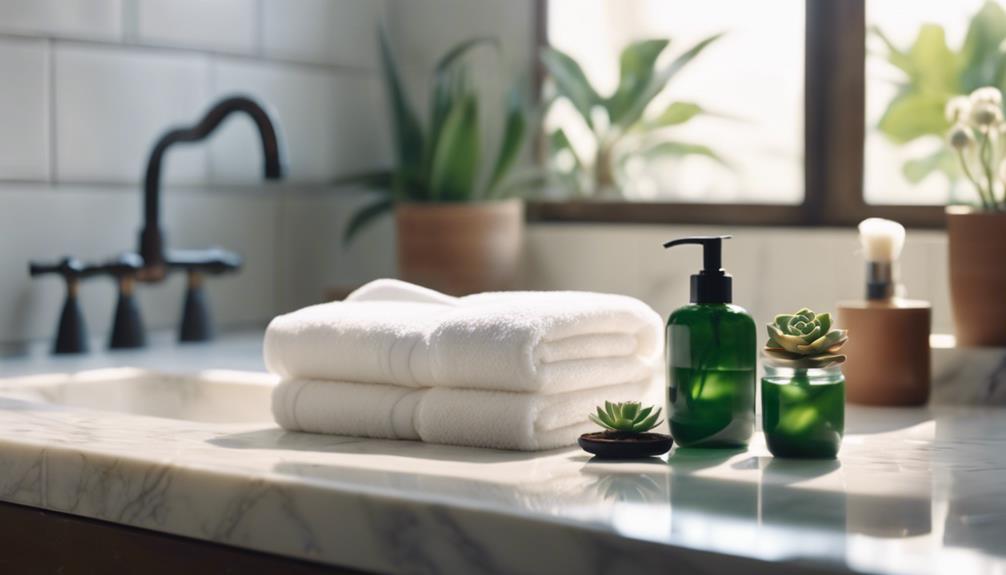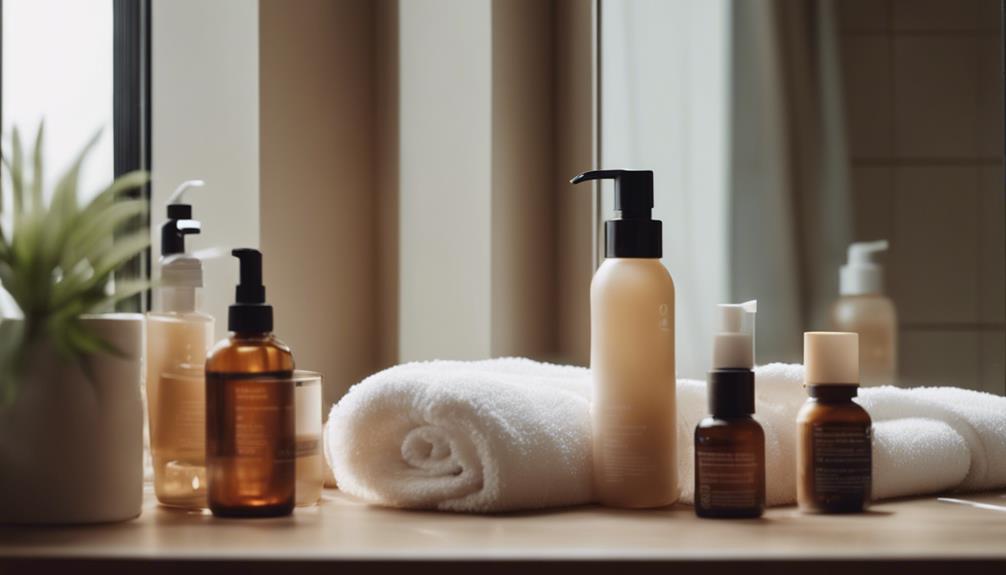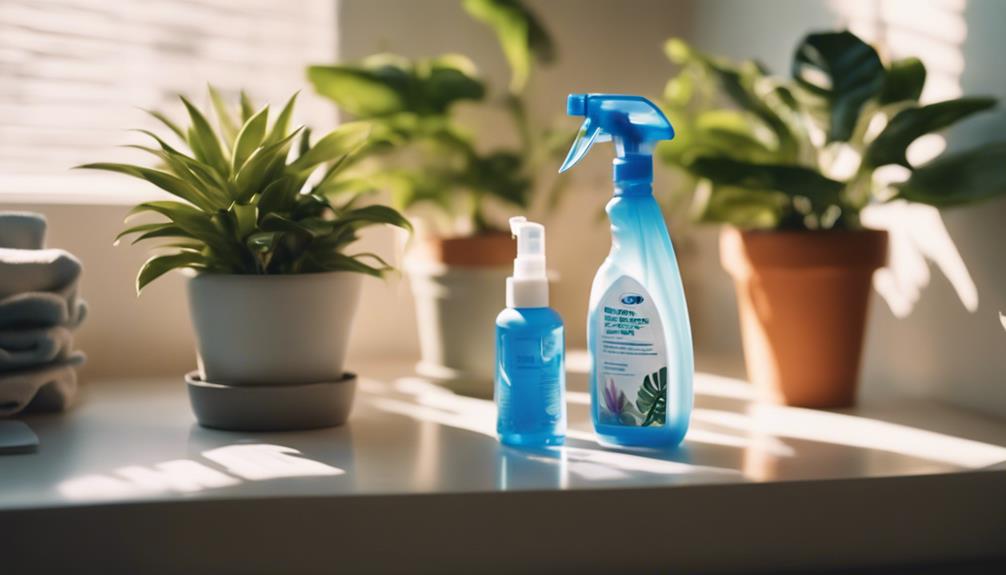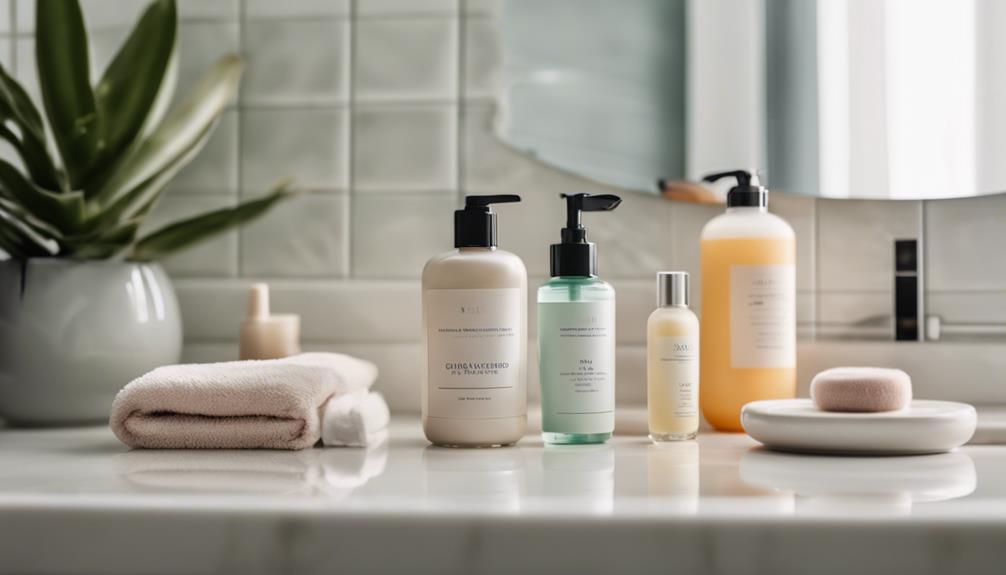To achieve and maintain healthy skin, it is essential to first identify your skin type. Cleanse your face gently twice a day using a suitable cleanser. Use toner to balance the pH levels of your skin, followed by a moisturizer to lock in hydration. Make sure to apply broad-spectrum sunscreen daily to prevent aging and skin cancer. Develop a nighttime routine that includes cleansing, toning, and using targeted treatments for specific skin concerns. Additionally, remember to care for your neck and avoid excessive exfoliation. It is important to also incorporate healthy lifestyle habits to enhance your skincare routine. Stay tuned for more detailed steps on improving your daily skincare regimen!
Key Takeaways
- Identify your skin type to choose appropriate products for cleansing, toning, moisturizing, and sun protection.
- Establish a daily routine that includes cleansing, toning, moisturizing, and applying sunscreen each morning.
- Use a gentle cleanser twice daily, followed by a toner to restore pH balance and prepare skin for treatments.
- Apply a suitable moisturizer to lock in hydration, with lightweight options for oily skin and thicker formulations for dry skin.
Identify Your Skin Type
To create an effective skincare routine, you first need to identify your skin type. Understanding whether your skin is dry, oily, combination, sensitive, or normal will help you choose the right skin care products.
For instance, if you have dry skin, you'll notice flakiness and rough patches. In this case, opt for hydrating formulas and a gentle cleanser that won't irritate your skin.
On the other hand, if your skin is oily, you'll likely deal with shine and enlarged pores. You'll want to look for oil-free products that balance your skin without stripping it.
Combination skin features both oily areas, often in the T-zone, and dry patches, requiring a tailored approach.
Sensitive skin, prone to reactions like redness or stinging, benefits from calming, gentle products.
Essential Daily Steps
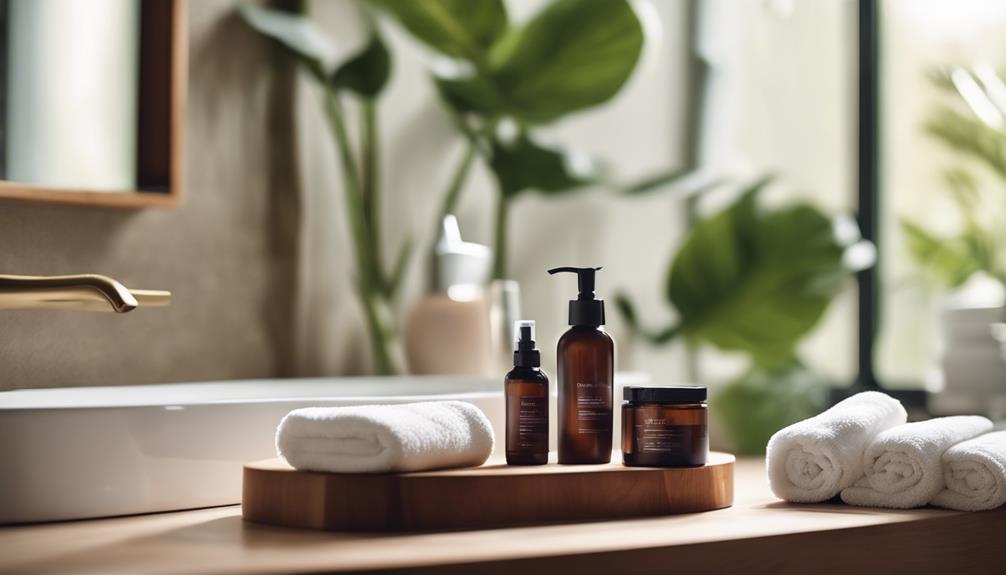
To achieve healthy skin, you can't skip the essential daily steps: cleansing, toning, and moisturizing.
Each of these techniques plays a vital role in maintaining your skin's balance and hydration.
Let's explore how to properly cleanse, the importance of toning, and the essentials of moisturizing.
Cleansing Techniques
A proper cleansing routine is essential for keeping your skin clear and healthy. Regular cleansing removes dirt, oil, and impurities that can lead to clogged pores and breakouts.
Here are some effective cleansing techniques you should incorporate into your daily routine:
- Use a gentle cleanser that matches your skin type.
- Rinse with lukewarm water to effectively open your pores.
- Consider double cleansing for heavy makeup or sunscreen.
Start by cleansing your face twice daily—once in the morning and once at night.
Choose a gentle cleanser that suits your skin type; gel-based cleansers work well for oily skin, while cream-based options are ideal for dry skin.
Rinse your face with lukewarm water to help the cleanser work better.
If you wear heavy makeup or sunscreen, use an oil-based cleanser first, followed by a water-based one for a thorough clean.
After cleansing, never skip the toner and moisturizer to maintain your skin's hydration and balance, guaranteeing a fresh and healthy complexion.
Importance of Toning
Toning is a critical step in your skincare routine that helps restore your skin's natural pH balance after cleansing. Cleansers can disrupt this balance, making toning indispensable for ensuring ideal skin function. By using a toner, you not only remove any residual impurities but also enhance your skin's overall cleanliness, reducing the risk of clogged pores and breakouts.
A well-formulated toner provides hydration and can target specific skin concerns such as dryness, oiliness, or sensitivity. This added hydration is essential for maintaining skin health and preparing your complexion for the next steps in your routine. When you apply serums and moisturizers after toning, your skin absorbs these active ingredients more effectively, leading to improved results over time.
Incorporating toner into your daily regimen promotes a refreshed and revitalized complexion. With consistent use, you'll notice a more balanced and radiant appearance. So, don't skip this crucial step—your skin will thank you for the extra care!
Moisturizing Essentials
After toning, applying a moisturizer is key to locking in hydration and reinforcing your skin's protective barrier. Moisturizing is essential for all skin types, so it's important to choose one that suits yours.
Applying moisturizer on damp skin enhances absorption, maximizing benefits.
Here are some tips to reflect upon:
- Choose the Right Texture: Lightweight formulas work best for oily skin, while thicker creams benefit dry skin.
- Look for Key Ingredients: Hyaluronic acid boosts hydration, and ceramides help repair the skin barrier.
- Don't Skip SPF: For daytime, opt for a moisturizer with broad-spectrum SPF 30 or higher to protect against UV damage.
With consistent use, you'll notice improvements in skin texture and a reduction in fine lines over time.
Importance of Sun Protection
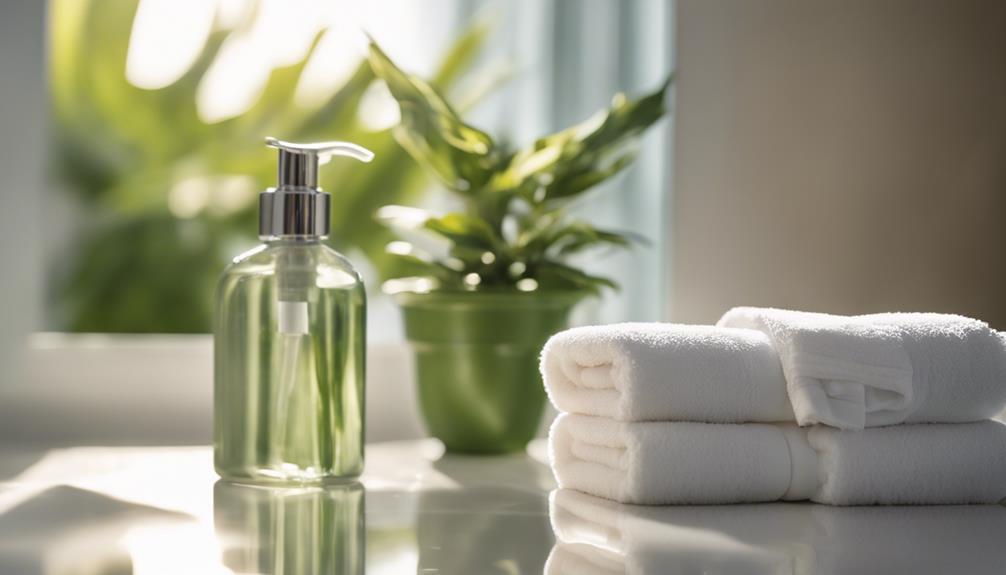
Understanding the importance of sun protection is key to maintaining healthy skin.
You need to apply broad-spectrum sunscreen daily, even on cloudy days, and consider wearing protective clothing to shield yourself from harmful UV rays.
UV Ray Awareness
Protecting your skin from harmful UV rays is crucial for preventing premature aging and reducing the risk of skin cancer. Whether it's sunny or cloudy, UV rays can penetrate through and cause damage. By being aware and taking action, you can maintain healthy skin for years to come.
- Use broad-spectrum sunscreen with an SPF of 30 or higher.
- Reapply every two hours, especially after swimming or sweating.
- Wear protective clothing, like wide-brimmed hats and UPF-rated garments.
Regular application of sunscreen is essential in your daily routine. Many people underestimate the importance of sun protection, leaving their skin vulnerable.
Daily Sunscreen Application
Daily sunscreen application is essential for keeping your skin healthy and reducing the risk of skin cancer. Using a broad-spectrum sunscreen with at least SPF 30 protects you from both UVA and UVB rays, which can cause premature aging and increase skin cancer risk. Remember to reapply your sunscreen every two hours, especially after swimming or sweating, to maintain effective sun protection throughout the day.
Even on cloudy days, up to 80% of UV rays can penetrate clouds, so don't skip this important step in your daily skincare routine. Statistics show that 1 in 5 Americans will be diagnosed with skin cancer in their lifetime, making daily application of sunscreen non-negotiable.
Here's a quick reference on sunscreen:
| Factor | Importance |
|---|---|
| SPF 30+ | Blocks at least 97% of UVB rays |
| Daily Application | Essential for ongoing protection |
| Reapplication Frequency | Every 2 hours for maximum effectiveness |
Incorporating sunscreen into your daily routine is a simple yet critical step in maintaining healthy skin and preventing skin cancer. Don't underestimate the power of sun protection!
Protective Clothing Choices
Choosing the right protective clothing is essential for minimizing UV exposure and enhancing your sun protection strategy. By making smart clothing choices, you can considerably protect your skin from harmful rays and lower overall UV risk.
- Opt for wearing UPF-rated clothing, which offers additional UV protection.
- Choose wide-brimmed hats to shield your face, neck, and ears.
- Go for tightly woven fabrics and darker colors for better UV blocking.
Incorporating these elements into your wardrobe can greatly reduce UV exposure. Wearing UPF-rated clothing provides an extra layer of defense alongside sunscreen, particularly during peak sun hours.
Wide-brimmed hats don't just complete your look; they play an important role in protecting areas often neglected. Remember, tightly woven fabrics block rays more effectively, and darker colors enhance this protection.
Long-sleeved garments also minimize skin exposure, which is essential for anyone spending time outdoors.
Nighttime Skincare Routine
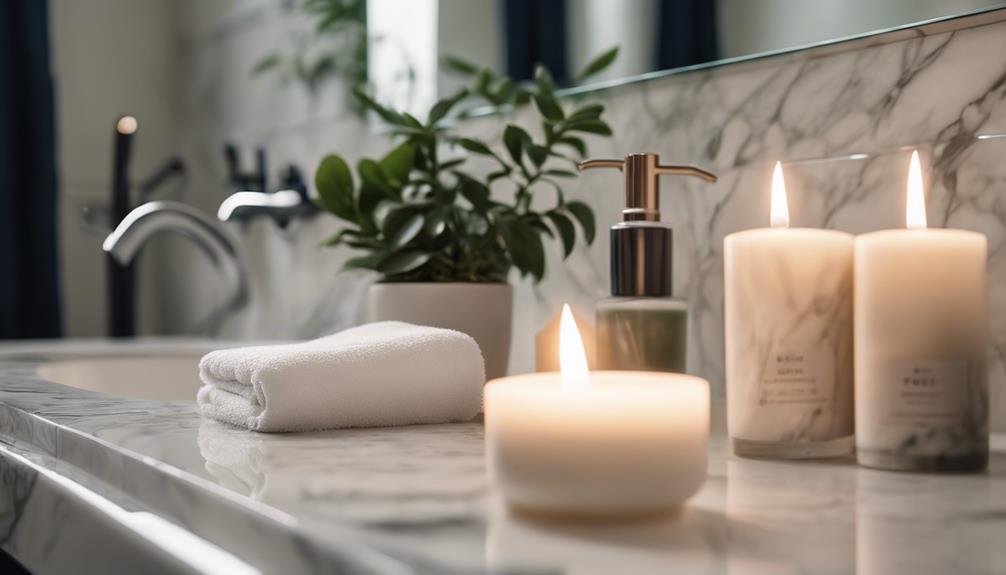
A well-structured nighttime skincare routine sets the stage for your skin to repair and rejuvenate while you sleep. Start with double cleansing: an oil-based cleanser to remove makeup and sunscreen, followed by a water-based cleanser for complete cleansing.
Next, exfoliation should be part of your routine 2-3 times a week. This promotes cell turnover and improves skin texture, but be cautious not to over-exfoliate to avoid irritation. After cleansing, apply a hydrating toner to balance your skin's pH and enhance product absorption.
Now, incorporate targeted treatment serums that cater to your specific concerns. For instance, use retinol for anti-aging or salicylic acid for acne, as these treatments work best overnight. Finally, finish with a moisturizer tailored to your skin type. This locks in hydration and supports your skin barrier while you sleep.
| Step | Purpose |
|---|---|
| Cleansing | Remove impurities |
| Exfoliation | Promote cell turnover |
| Hydrating Toner | Balance pH and prep skin |
| Treatment Serums | Target specific skin concerns |
Common Mistakes to Avoid
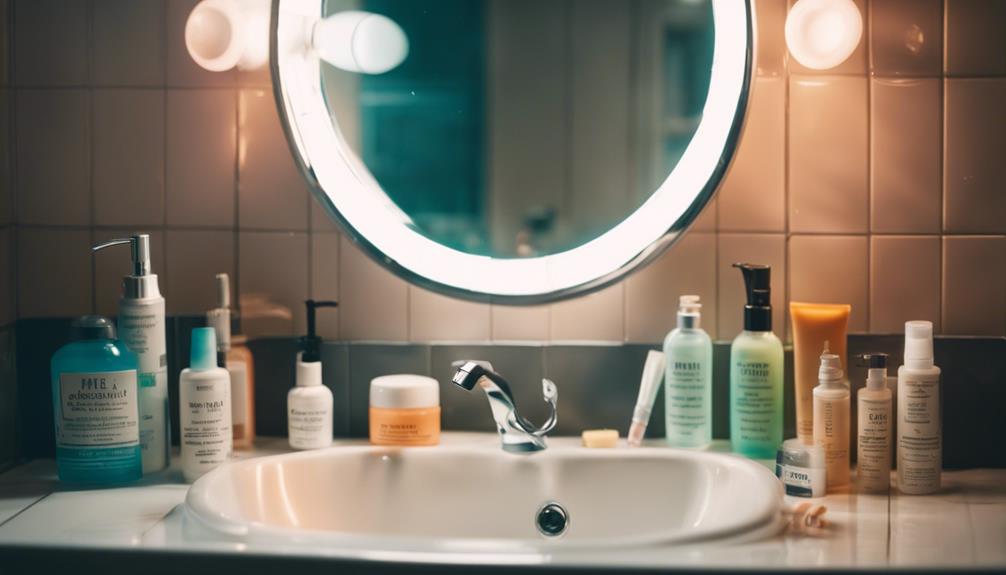
Many people make common mistakes in their skincare routines that can hinder their progress towards healthier skin. Avoiding these pitfalls can lead to better results and a more effective skincare routine.
Skipping sunscreen, even on cloudy days, leaves your skin vulnerable to harmful UV rays.
Over-exfoliating can irritate your skin, causing redness and increased sensitivity.
Using skin care products not suited for your skin type can exacerbate existing issues.
Neglecting your neck and décolletage can lead to uneven aging.
To protect your skin, always apply sunscreen daily for maximum protection against UV rays.
Limit exfoliation to 1-3 times per week to maintain a healthy balance.
Make sure to choose skin care products designed for your specific skin type, whether it's oily, dry, or combination.
Lifestyle Factors for Healthy Skin

Your daily lifestyle choices play an essential role in maintaining healthy skin and can greatly impact its appearance and resilience.
Start with your diet; incorporating plenty of fruits, vegetables, whole grains, and lean proteins supports your skin's health. These foods provide important nutrients that promote a vibrant complexion. Don't forget about hydration—drinking enough water daily keeps your skin moisturized and helps flush out toxins that can harm your appearance.
Sleep is another significant factor. Aim for 7-9 hours each night to reduce dark circles and allow your skin the time it needs for repair.
Managing stress is equally important; high stress levels can lead to breakouts and skin sensitivity. You can combat this by engaging in activities like exercise, meditation, or pursuing hobbies that you enjoy.
What are the benefits of a daily skincare routine for maintaining healthy skin?
Maintaining healthy skin requires consistency and commitment, both of which can be achieved through daily skincare essentials. A daily skincare routine can help keep the skin clean, moisturized, and protected from environmental damage. It also promotes cell turnover, reduces the appearance of aging, and helps maintain a radiant complexion.
Conclusion
By following a consistent daily skincare routine tailored to your skin type, you can maintain healthy skin and boost your confidence.
For instance, Sarah, a busy professional, started using a gentle cleanser and moisturizer, plus SPF every morning. Within weeks, her skin felt smoother and looked more radiant, making her feel more self-assured at work.
Remember, it's not just about products; it's about the habits you build. Prioritize your skin, and you'll see the difference.
